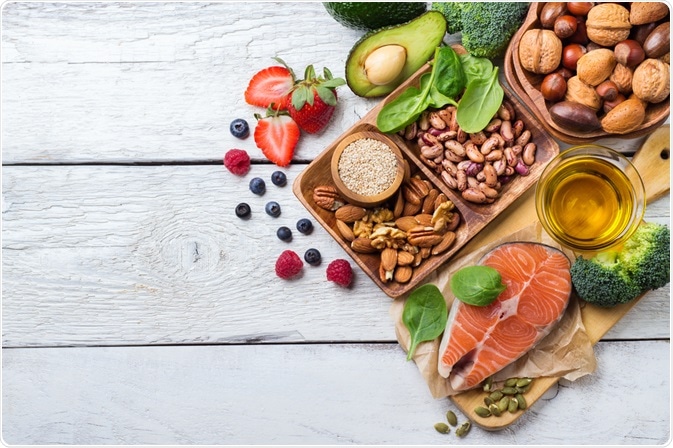Cancer is the second leading cause of death worldwide. In addition to genetics and environmental factors, the type of food we consume each day can play a role in cancer prevention and health after a cancer diagnosis.

Antonina Vlasova | Shutterstock
What are Reactive Oxygen Species (ROS)?
Reactive oxygen species (ROS) are generated from the metabolism of oxygen that occurs within the mitochondria of cells. This is a healthy process that occurs everyday. ROS are small oxygen-derived molecules that include:
- Superoxide (O2•-)
- Hydroxyl (•OH)
- Peroxyl (RO2•)
- Alkoxyl (RO•)
- Singlet Oxygen (O2)
- Hydrogen Peroxide (H2O2)
The removal of ROS is normally achieved through various natural detoxification mechanisms, including enzymatic reaction (with molecules such as superoxide dismutase) and non-enzymatic molecules such as antioxidants.
Low levels of ROS in the body allow for intracellular signaling processes and homeostasis to be maintained; however, when present at high levels, ROS can significantly damage proteins, lipids, and DNA.
Oxidative stress and cancer
Cancer cells exhibit high levels of ROS. There can be many reasons for this, including internal factors such as hormones, immune-specific conditions, and environmental factors (tobacco use, exposure to radiation, and infection). The role of ROS in cancer has been shown to be important to cancer cell survival, tumor cell proliferation, and invasion of surrounding tissues and distant metastasis.
Antioxidants
As previously mentioned, cells are equipped with various innate antioxidants to remove ROS from the body. For example, glutathione is an intracellular molecule that can protect cells against the deleterious effects of ROS.
Luckily, there are numerous foods that contain important antioxidants that can help protect the body from damaging effects of ROS. Numerous clinical studies have found that a high intake of fruits and vegetables that are rich in antioxidants not only protects cells from cancer development but also reduce mortality in healthy persons.
Vitamin C (Ascorbic Acid)
As an essential nutrient, vitamin C (ascorbic acid) is an antioxidant by virtue of its ability to function as a potent free radical scavenger. Vitamin C protects cells against oxidative damage caused from ROS by protecting against DNA mutations and damage to lipids that occurs through peroxidative stress; it also assists in the repair of amino acids that have been oxidized by ROS.
The current recommended dietary allowance (RDA) for vitamin C is 75 milligrams (mg) each day for women and 90 mg each day for men. Some foods high in vitamin C include:
- Oranges
- Bell peppers
- Broccoli
- Cabbage
- Brussel sprouts
- Kohlrabi
- Snow peas
- Cauliflower
- Kale
- Papaya
- Strawberries
- Pineapple
- Kiwi
- Mango
Beta Carotene
Beta-carotene (provitamin A) has been associated with reduced cancer risk through improvement in white blood cell functionality to fight ROS. Although an RDA exists for vitamin A, there is no current RDA for beta-carotene. However, excessively high beta-carotene intake has been associated with carotenemia, a condition that causes the skin turns a yellow-orange color.
Some food items that contain high levels of beta-carotene include:
- Carrots
- Squash
- Collards
- Spinach
- Sweet potatoes
- Strawberries
- Cantaloupe
- Broccoli
Vitamin E
As another essential nutrient, vitamin E is responsible for helping to build normal red blood cells. The antioxidant properties of vitamin E have been shown to prevent the production of ROS in lipids that are undergoing oxidation. Plasma membranes of cells are comprised of a lipid bilayer that vitamin E has been shown to protect with respect to fluidity, phase separation, and lipid domains. These effects ultimately help maintain bioactivity.
The current RDA for vitamin E is 15 mg per day. Food items that are high in vitamin E include:
- Spinach
- Dandelion greens
- Tomato sauce
- Swiss chard
- Turnip greens
- Red peppers
- Avocados
- Grain products
- Eggs
- Eel
- Sardines
- Tuna
- Almonds
- Sunflower seeds
- Hazelnuts
- Peanuts
- Pine nuts
- Brazil nuts
- Vegetable oil
Sources
- Prasad, S., Gupta, S. C., & Tyagi, A. K. (2017). Reactive oxygen species (ROS) and cancer: Role of antioxidative nutraceuticals. Cancer Letters 387; 95-105. https://doi.org/10.1016/j.canlet.2016.03.042
- An Introduction to Reactive Oxygen Species
- Grosso, G., Bei, R., Mistretta, A., Marventano, S., Calabrese, G., Masuelli, L., et al. (2013). Effects of Vitamin C on Health: A Review of Evidence. Frontiers in Bioscience 18; 1017-1029.
- Food Sources of Vitamin C
- Beta-Carotene Molecule
- Antioxidants as Part of your Cancer Diet
- Traber, M. G., & Atkinson, J. (2007). Vitamin E, Antioxidant and Nothing More. Free Radical Biology and Medicine 43(1); 4-15.
- Food Sources of Vitamin E
Further Reading
Last Updated: Mar 11, 2023